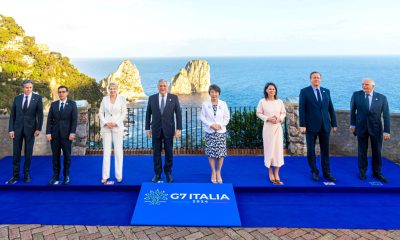Kazachstanas
ES ir Centrinės Azijos aukščiausiojo lygio susitikime ieškoma būdų, kaip toliau gilinti santykius

High level efforts to strengthen the increasingly important relationship between the European Union and the the five Central Asian states continued at a summit in Kyrgyzstan. Leaders met with European Council President Charles Michel and agreed that their foreign ministers would work with the EU’s High Representative to formalise and advance the implementation of the Joint Road Map for Deepening Ties between the EU and Central Asia, writes Political Editor Nick Powell.
In the midst of geopolitical turmoil, both the EU and the states of Central Asia have recognised that they have much to offer one another by building a close relationship that offers stability and certainty in a world where reliability is in short supply. Trade in oil, gas and essential raw materials and the safe transit of goods between Asia and Europe are cornerstones of the relationship.
The task now is to create a deeper political partnership. The largest Central Asian state, Kazakhstan, has been leading the way with its agreement with the EU on enhanced partnership and cooperation. President Kassym-Jomart Tokayev held a bilateral meeting with European Council President Charles Michel in the margins of the summit in Cholpon-Ata, Kyrgyzstan.
The Kazakh President noted the priority being given to their strategic partnership, which has made the EU a leading trade partner and a leading investor in Kazakhstan’s economy. Charles Michel offered his high appreciation of the growing dynamics of cooperation between the European Union and Kazakhstan, pointing to the need to work together to develop further interaction.
In his speech to the summit, President Tokayev expressed his appreciation of the support of the European Union for his country’s large-scale democratic reforms and its foreign policy initiatives. That spirit was also found in joint communiqué issued in the name of all five Central Asian presidents, as well as the European Council President.
It recorded that the leaders had expressed continued commitment to uphold the UN Charter, particularly the principles of respect for the independence, sovereignty and territorial integrity of all countries, the non-use of force, or the threat of force, and the peaceful settlement of international disputes.
There was particular concern about the situation in Afghanistan, with a call for greater humanitarian assistance and the establishment of an inclusive and representative government in Kabul. The leaders also emphasised the need for greater efforts to stop the incitement of terrorism through the spread of propaganda via the internet.
There was a pledge of further cooperation to strengthen the rule of law, good governance, gender equality and universal human rights and fundamental freedoms. The leaders welcomed the new Team Europe initiatives on water, energy and climate change and on digital connectivity. They stressed the importance of expanding mutual trade and investment and of close dialogue on the implementation of the EU’s sanctions regimes.
President Michel welcomed ongoing efforts for socio-economic and democratic reforms as important building blocks for EU-Central Asia cooperation.
Pasidalinkite šiuo straipsniu:
-

 Tabakasprieš 5 dienas
Tabakasprieš 5 dienasKodėl ES tabako kontrolės politika neveikia
-

 Vidurio Rytaiprieš 5 dienas
Vidurio Rytaiprieš 5 dienasES reakcija į Izraelio raketų smūgį Iranui reiškia įspėjimą Gazos ruože
-

 Kazachstanasprieš 4 dienas
Kazachstanasprieš 4 dienasKazachstano kelionė nuo pagalbos gavėjo iki donoro: kaip Kazachstano pagalba vystymuisi prisideda prie regioninio saugumo
-

 Kazachstanasprieš 4 dienas
Kazachstanasprieš 4 dienasKazachstano ataskaita apie smurto aukas























